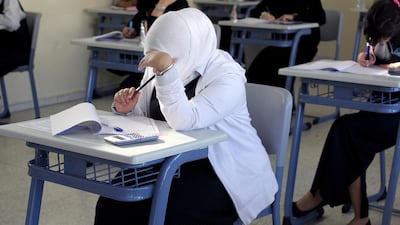In the UAE and many other nations, March is the month of mid-term exams. In the run-up to the spring break, with assignments to be submitted and exams to be revised for, student workloads mount and deadlines loom.
On the whole, students rise to this challenge, and through their efforts, they develop both academically and personally. For whatever reason – be it overwork, an obsession with success, or just sheer laziness – some students will cheat at some point in their academic careers. In an increasingly connected world, where vast archives of information and a variety of unethical services are easily accessible on the internet, this can range from plagiarising essays, buying them, or plain, old-fashioned sneaking notes – or phones – into exams.
Exploring the extent of the problem, the International Centre for Academic Integrity compiled global surveys of cheating spanning the 12 years from 2002 to 2015, including data for 71,300 undergraduate students. They found that 39 per cent reported having cheated on an exam, while 64 per cent said they had cheated on a written assignment. It also appears that, in general, cheats do prosper. A survey conducted by Fordham University in the US found that students who reported cheating had significantly higher grade point averages (3.41 out of 4) than their non-cheating counterparts (2.85 out of 4). The cheats got, on average, B-pluses while the non-cheats got B-minuses.
Academic dishonesty also appears to be worsening, exacerbated by the emergence of websites, known as essay mills, that offer an array of dubious educational writing services. The use of such services has become known as "contract cheating" – in other words, paying a third party to write for you. A study published in the journal Frontiers in Education in 2018, suggested that, globally, up to 15.7 per cent of college students have engaged in this practice, with the rate rising rapidly over the past few decades.
In 2017, the UK’s Quality Assurance Agency (QAA) reported that more than 100 essay mills were in operation and urged universities to strengthen their policies on academic integrity. The essence of the QAA’s guidance was that, if information technology is facilitating academic dishonesty, then information technology can also be used to combat the problem. This has already started to happen, with far-reaching implications, thanks to the introduction of increasingly sophisticated plagiarism detection applications.
In 2012, Pal Schmitt, resigned as President of Hungary after he was stripped of his doctorate by Semmelweis University in Austria over allegations of plagiarism related to his 1992 doctoral dissertation.
In 2013, Annette Schavan, then Germany's education and research minister, was stripped of her doctoral degree by the University of Düsseldorf after instances of plagiarism were detected in her 1980 dissertation. Ironically, it was titled Person and Conscience.
In 2014, the US Army War College in Pennsylvania rescinded the masters' degree of former US senator John E Walsh for the same reason.
These are the high-profile cases that make the media, but many more don’t. The other common feature of the above examples is that plagiarism was detected many years after the original academic work had been submitted, graded and forgotten about.
Now that academic papers are preserved for posterity and made accessible to vast numbers of people online, evidence of academic malfeasance is more or less impossible to escape.
In this sense, strong parallels are beginning to emerge between academia and the world of sport, in which doping scandals have retroactively exposed a number of champions as cheats. One of the best-known examples of this occurred in 2012, when the cyclist Lance Armstrong was banned for life from competition and stripped of seven Tour de France titles.
In athletics it is reasonably common to hold urine or blood samples for 10 years or more, in the knowledge that technology will advance and be able to retest samples for performance-enhancing substances that are undetectable today. Some universities hold copies of student work for centuries, and now they are easier to find and search than ever.
The already powerful anti-plagiarism software that we have now will only get slicker, quicker and smarter. As regards contract cheating, detecting the authenticity of authorship is not that difficult for a computer. After all, there are already basic algorithms that can correctly attribute the authorship of Beatles songs to either John Lennon or Paul McCartney, based on linguistic analysis alone.
Meanwhile, work in this area carried out at Zayed University and presented at the British Psychological Society Conference in 2017 has explored the use of wearable eye-tracking devices as a deterrent to cheating on closed-book exams.
The need to reverse this dangerous trend of academic dishonesty is clear, but we are getting closer by the day to stamping it out once and for all.
Dr Justin Thomas is a professor of psychology at Zayed University

